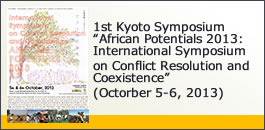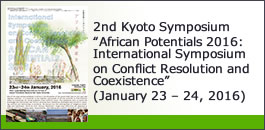Synopsis & Keywords
Contemporary African societies face the task of how to prevent conflict and violence, and how to reconstruct and rejuvenate the social order destroyed and exhausted by conflicts. The goal of this research project is to explore the road to the realization of coexistence, reconciliation and social recovery by elucidating the African potential embodied in the knowledge and social institutions created, accumulated, and managed by the African people themselves. This approach is markedly different from trying to find solutions through simply importing and applying concepts and values of Western origin, such as even democracy and human rights.
Key words: Africa, conflict and coexistence, African Potentials, Interface Functions, reconciliation and social reconstruction, indigenous knowledge and social institutions
Background and Goals of Research
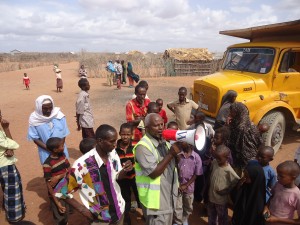 The difficulty faced by African society today is the exhaustion and fragmentation of social order brought about by conflicts, and dealing rapidly and effectively with this issue is the key to the stability and growth of the African society. Especially since the 1990s, a large number of refugees and IDPs have been brought about due to the frequent eruption of many and varied conflicts including massive civil wars and local conflicts. To cope with this situation, the international community has achieved some success through military interventions, brokering of cease-fires and peace treaties, post-conflict social reconstruction, legal intervention by International Criminal Court, and aid from civilians donated through the NPOs. However, the firm guiding principle of these interventions was the Western values and mores of liberal democracy and justice under the law.
The difficulty faced by African society today is the exhaustion and fragmentation of social order brought about by conflicts, and dealing rapidly and effectively with this issue is the key to the stability and growth of the African society. Especially since the 1990s, a large number of refugees and IDPs have been brought about due to the frequent eruption of many and varied conflicts including massive civil wars and local conflicts. To cope with this situation, the international community has achieved some success through military interventions, brokering of cease-fires and peace treaties, post-conflict social reconstruction, legal intervention by International Criminal Court, and aid from civilians donated through the NPOs. However, the firm guiding principle of these interventions was the Western values and mores of liberal democracy and justice under the law.
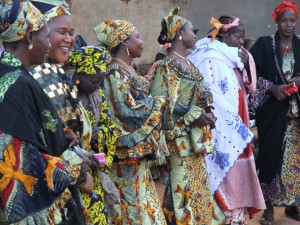 By contrast, our project is based on the assumption that African people themselves have created, accumulated, and managed knowledge and social institutions that have proven to be effective in resolving conflicts and achieving coexistence, and that these can be applied to contemporary conflict resolution, reconciliation among peoples, and the post-conflict reconstruction of society. This capacity of Africa which we term, the African Potentials, is not to be regarded as some isolated and unchanging entity, but rather, an evolution formed out of repeated collision and integration with the outside influences of the West and the Arab/Islamic world. We call this capacity for transformation the Interface Functions of Africa. This research project will reassess African potential capacity, to seek practical and effective applications of the potential capacity for conflict resolution and coexistence in confluence with the various exogenous factors including the international community.
By contrast, our project is based on the assumption that African people themselves have created, accumulated, and managed knowledge and social institutions that have proven to be effective in resolving conflicts and achieving coexistence, and that these can be applied to contemporary conflict resolution, reconciliation among peoples, and the post-conflict reconstruction of society. This capacity of Africa which we term, the African Potentials, is not to be regarded as some isolated and unchanging entity, but rather, an evolution formed out of repeated collision and integration with the outside influences of the West and the Arab/Islamic world. We call this capacity for transformation the Interface Functions of Africa. This research project will reassess African potential capacity, to seek practical and effective applications of the potential capacity for conflict resolution and coexistence in confluence with the various exogenous factors including the international community.
Expected Results and Significance
The research will elucidate the knowledge and social institutions that constitute the African Potentials and Interface Functions accumulated by African societies that have been underplayed in previous debates on conflict resolution and peace building, and suggest avenues to harness that capacity.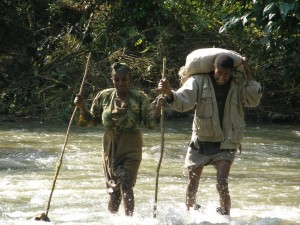
The interdisciplinary area studies will be the powerful tool in carrying out integrated and comprehensive academic research for global dissemination of research results through the promotion of an open and cooperative research program in cooperation with NPOs and foreign researchers, especially African researchers.
We believe it is the duty of researchers in area studies to meet the needs of society to resolve the difficult issues faced by contemporary Africa.
Forward by Project Representative
Contemporary Africa has frequently experienced civil war, ethnic violence, religious conflicts, and fights over natural resources, especially since the 1990s. Many major events are fresh in our memory, such as the genocide in Rwanda where nearly 1 million people fell victim, or the 20-year long civil war that lead to the independence of South Sudan in July 2011. Besides those major disruptions, a great variety of smaller conflicts have occurred over land use between farming and pastoral peoples, or the confrontation between government administration and local people in the establishment of national parks.
To deal with these regional conflicts, the international community has sent into Africa peace keeping operations of the UN and AU, imposed economic sanctions, negotiated cease fires and peace treaties, helped reconstruct the nation-state in post-conflict periods, or legally intervened with the International Criminal Court, while numerous non-government civil organizations lead by NPOs have also sent aid. All these efforts have achieved some success. However, all interventions were based on policies and values originating in the West. And these efforts seem to assume that the international community needs to provide the conflict resolution mechanisms that are lacking in African societies. Furthermore, these interventions from the outside world have not been successful in ultimately achieving the reconciliation and social reconstruction among the Africans themselves so seriously hurt in conflict.
To overcome this difficult situation, we need to reconsider our fundamental assumptions and be inspired directly from the daily life within African societies. Knowledge and social institutions have been generated and utilized by the African people. And the African people have used their own prescriptions to initiate conflict resolutions and realize coexistence. These African knowledge and social institutions should still be applicable for planning to resolve the contemporary conflicts and reconstructing social order.
However, we emphasize that we are not advocating an exclusive or closed attitude towards ideas originating from outside Africa, nor are we claiming that all efforts by the international community are obtrusive. Romanticizing or essentializing the African “tradition” is an attitude we would be the first to criticize and reject. Africa has repeatedly interacted, come into conflict and conjugated with the Western and Arabic/Islamic cultures that are the outside world, and in the process, has transformed and recreated itself. We believe in this research project that African societies have long maintained the ability to negotiate and renew their ability to resolve problems within such contexts of interactions with the outside. In this research project, we will call this ability the Interface Functions.
African studies in Japan have applied long term field research to produce its own unique inter-disciplinary studies on conflict, bridging the macro scale African history and political economy with the micro scale socio-cultural milieu. This project was planned based on this long history of Japanese African studies that has accumulated knowledge on furthering the understanding of the indigenous experiences within African societies. All researchers participating in this project have carried out long-term field research in Africa, and have seen for themselves how so many conflicts deeply affected the people. We all share the conviction that the African peoples themselves have sought to resolve conflicts on their own initiative using their own accumulated and managed systems of knowledge and social institutions.
Above is the basic approach of this research project. As one of the main goals for this research, we wish to do away with the mistaken, negative images of Africa, such as that “the African people are backwards and in stasis,” or that they are “unable to solve their own problems.”
Itaru Ohta
Project Representative,
Professor, The Center for African Area Studies,
Kyoto University
Closing Remarks by the Project Representative
This 5-year project has come to an end by March 2016. About 20 African scholars, as well as about 50 Japanese researchers joined this project to explore what ‘African Potentials’ is.
Our mission was to strive for empiricism and objectivity in the description of the ‘African Potentials’ as well as to struggle to expand our philosophy and concepts beyond Western modernistic centralism. Our grand goal was to identify the ‘African Potentials’ from the daily existence of the African people, describe this in detail, and to offer this to the public to be made available to our fellow contemporaries as well as to future generations.
We have organized annually the African Forum in diverse host cities to exchange ideas with various African researchers as well as professionals working in peace building, etc., so that we may make clear and propagate our core concept of the ‘African Potentials.’ The first Forum was in Nairobi in 2011, the second in Harare in 2012, the third in Juba in 2013, the fourth in Yaounde in 2014, and the fifth in Addis Ababa in 2015. We have also held two Symposia in Kyoto in October 2013 and January 2016.
Through these cooperative activities, we established a close network of African and Japanese scholars and practitioners. Making full use of this network, we are planning to conduct the second phase of research project on ‘African Potentials.’
Itaru Ohta
Project Representative,
Professor, The Center for African Area Studies,
Kyoto University

